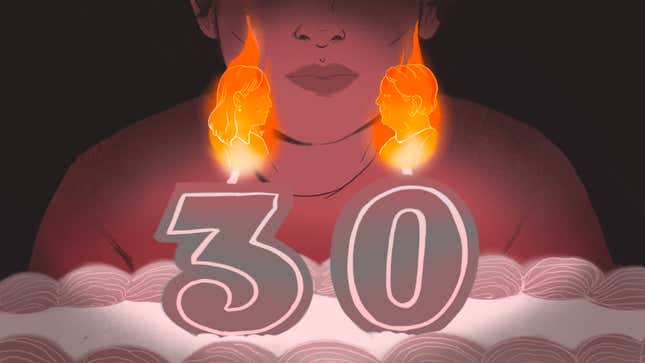Thoughts on Turning 30
By this point should we have unpacked our many suitcases of generational trauma?
In Depth

This year, I will undergo a process that billions upon billions of people have undergone in the course of human history: turn 30 years old. According to every bit of cultural wisdom related to this pivotal albeit unremarkable age, this means I am officially exiting my youth and entering Real Adulthood. I’ll no longer be desirable by most straight men, unless they’re into cougars, but somehow also: It’s time to evolve into my final form and become a mother.
As I inch closer to this fateful number, there is one thing that plagues me above all else: the idea that by this age, a person should have already sorted through most of their emotional baggage and shoved it into a deep hole, never to be resurfaced. This seems like a relatively fair ask in an age where therapy is a cellphone call away, but what about the special baggage? I mean the big fucking suitcases of bullshit handed down to you from your parents, grandparents, and their parents and grandparents. How exactly does one discover, unpack, and resolve generational trauma in the few months before their 30th birthday? Fuck if I know, but it feels like I’m supposed to do it.
Over this last year, it felt as if every popular show on television was rooted in some kind of traumatic self-exploration that found main characters discovering how their family history had left them unknowingly altered in some way. Shows like White Lotus, Ted Lasso, and Mare of Easttown were each on some level about the particular traumatic exchanges that occur between family members, specifically white parents and their white offspring. Leslie Priscilla Arreola-Hillenbrand, the founder of Latinx Parenting, explains that among these portrayals, “The biggest misconception is that once we are aware of what is happening, it should be easy to fix. Our family histories and the stories that have gone untold but have lived in our bodies require multiple people…to eventually shift the paradigm of intergenerational trauma.”
This onslaught of pop culture reminders has unlocked a treasure trove of concerns regarding what I might have picked up from my own family, and whether or not I had dealt with any of it by the time I turn 30. Turns out I have not! So, now, instead of sailing freely into this age bracket on my own, I find myself in deep contemplation over a past from which I thought I’d moved on, a past riddled with unexplained deaths, mismanaged grief, and a lineage of women who never let any of that shake them.
-

-

-

-

-

-

-

-

-

-

-

-

-

-

-

-

-

-

-

-

-

-

-

-

-

-

-

-

-

-

-

-

-

-

-

-

-

-

-

-








































